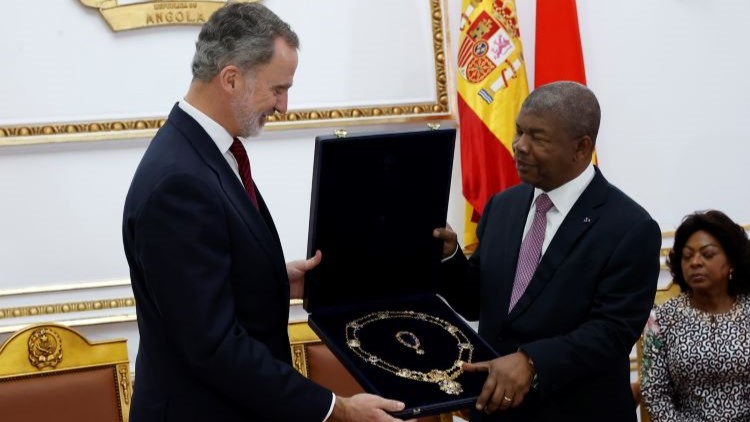The Diplomat
Don Felipe and Doña Letizia made yesterday the first day of their State visit to Angola, their first to a Sub-Saharan African country, during which the King highlighted the “African projection and vocation” of Spain.
The King and Queen of Spain, who are accompanied by the Minister of Foreign Affairs, José Manuel Albares, and the Secretary of State for Trade, Xiana Méndez, arrived late Monday at the Quatro de Fevereiro International Airport in Luanda, where they were received by the Spanish Ambassador to Angola, Manuel Lejarreta, and the Angolan Minister of Foreign Affairs, Tète António.
Yesterday began with a visit to the Agostinho Neto Memorial, where the King and Queen laid a wreath and observed a minute of silence before the monument, where the remains of the first president of independent Angola, António Agostinho Neto, rest. At mid-morning, the King and Queen went to the Presidential Palace, where they were officially received by the President of Angola, João Manuel Gonçalves Lourenço, and the First Lady, Ana Afonso Dias.
After the welcoming ceremony, the King held a meeting with Lourenço, while Doña Letizia met, accompanied by the First Lady and President of the Ngana Zanza Foundation, with a group of women leaders of the Angolan civil society to discuss education as a factor of empowerment. After the meetings, the King and Queen met with the President of Angola and the First Lady to attend the signing of Memoranda of Understanding on sports, industry 4.0 and diplomatic schools.
Exchange of decorations
Then, in the Noble Hall of the Palace, the ceremony of exchange of decorations took place, in which President Lourenço received the Collar of the Order of Civil Merit and his wife the Grand Cross of the Order of Civil Merit. Felipe VI and the Queen received the Collar of the Order of Agostinho Neto.
During the ceremony, the King affirmed that, apart from its “European identity” and its “well-known Ibero-American and Atlantic projection for obvious historical, cultural and linguistic reasons”, Spain also has an “African projection and vocation, both on the shores of the Mediterranean and towards the south of this vast continent”. “In recent years, the Spanish government, together with civil society in different areas and the private sector, has worked to better understand the reality of the continent as a whole and, in particular, Sub-Saharan Africa,” he continued. “The fruit of this are the plans and programs that have been put in place to increase our presence and cooperation with African countries and establish a strategic partnership to address together the many global challenges,” he added.
“In this objective, we need partners with capacity, credibility and will with whom, on the basis of mutual trust, Spain can be more present in the region for the benefit of all,” the Monarch said. “It is in this context that Angola is a priority country for Spain because of its political and social stability, its resources and good economic prospects and its active regional and multilateral diplomacy”, in addition to “the solid ties that already bind us, based on a relationship of almost fifty years, which began shortly after Angola gained its independence”, he added. “It is a matter, in short, of Spain being a reference for Angola in Europe and of Angola being a reference for Spain in this part of the world,” he said.
Later, the Angolan President and the First Lady offered a private lunch to the King and Queen of Spain. In the afternoon, Don Felipe and Doña Letizia went to the Economic Bank, where they attended the presentation of the International University of Cuanz – part of the network of institutions collaborating with the Ibero-American University Foundation (FUNIBER) – and inaugurated the Joan Miró exhibition El Cántico del Sol y las Maravillas Acrostáticas, with works from the private collection of this entity. The day ended with a reception by the King and Queen of Spain for the Spanish community in Angola, where there are more than 500 registered Spaniards, including businessmen, religious, teachers and aid workers.






